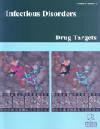-
s Unraveling Effector Functions of B Cells During Infection: The Hidden World Beyond Antibody Production
- Source: Infectious Disorders - Drug Targets (Formerly Current Drug Targets - Infectious Disorders), Volume 12, Issue 3, Jun 2012, p. 213 - 221
-
- 01 Jun 2012
Abstract
Antibodies made by B cells are critically important for immune protection to a variety of infectious agents. However, it is becoming increasingly clear that B cells do more than make antibodies and that B cells can both enhance and suppress immune responses. Furthermore, there is growing evidence that B cells modulate cellular immune responses by antibody dependent and independent mechanisms. Although we have a good understanding of the roles played by antibody- secreting effector B cells during immune responses, we know very little about the Ab independent “effector” functions of B cells in either health or disease. Given the recent data suggesting that B cells may contribute to autoimmune disease pathogenesis via an antibody independent mechanism and the increasing use of B cell depletion therapy in autoimmune patients, investigators are beginning to reassess the multiple roles for B cells during immune responses. In this article, we review data describing how B cells mediate protection to pathogens independently of antibody production. In particular, we will focus on the role that B cells play in facilitating dendritic cell and T cell interactions in lymph nodes, the importance of antigen-presenting B cells in sustaining effector T cell and T follicular helper responses to pathogens and the relevance of cytokine-producing effector and regulatory B cells in immune responses.


